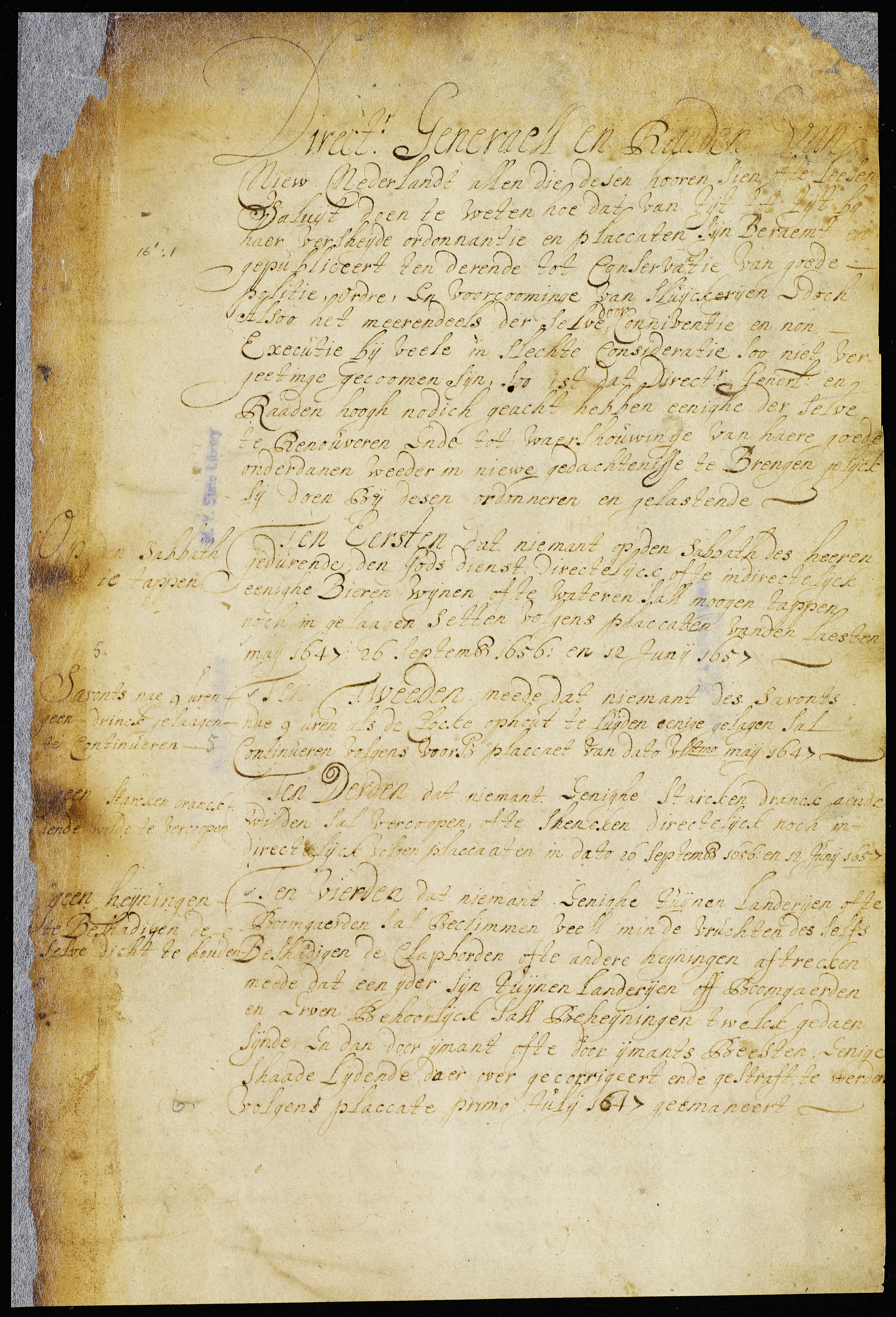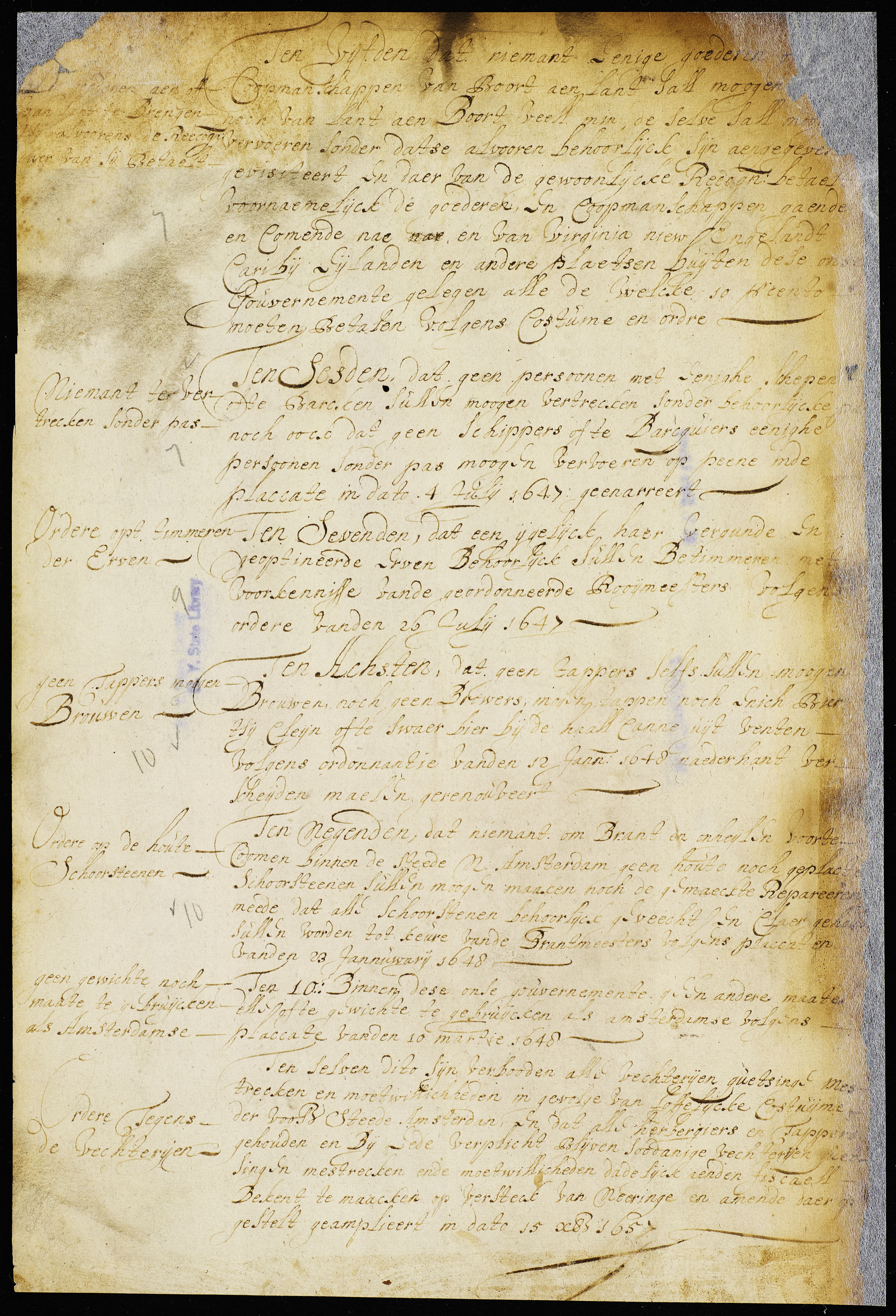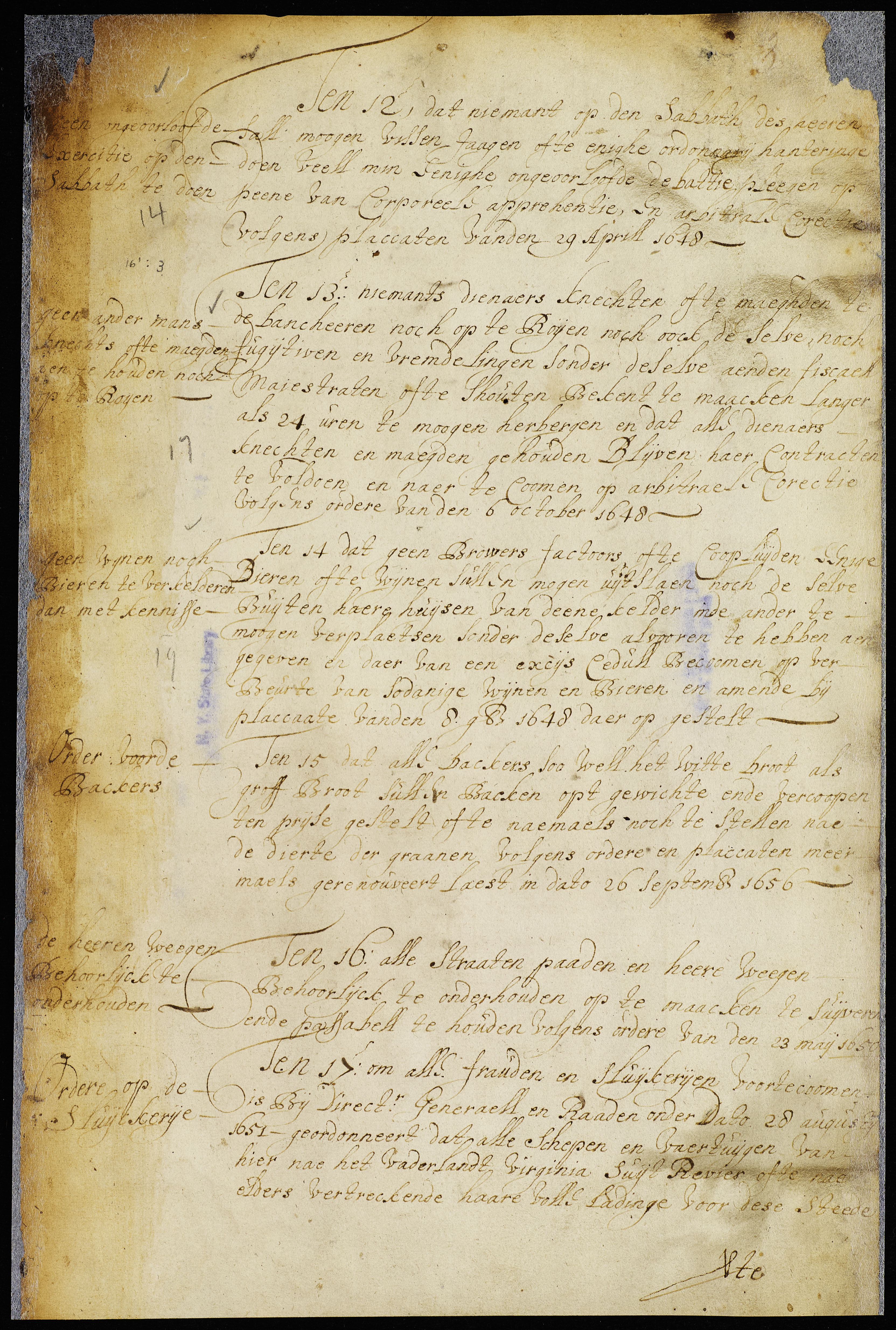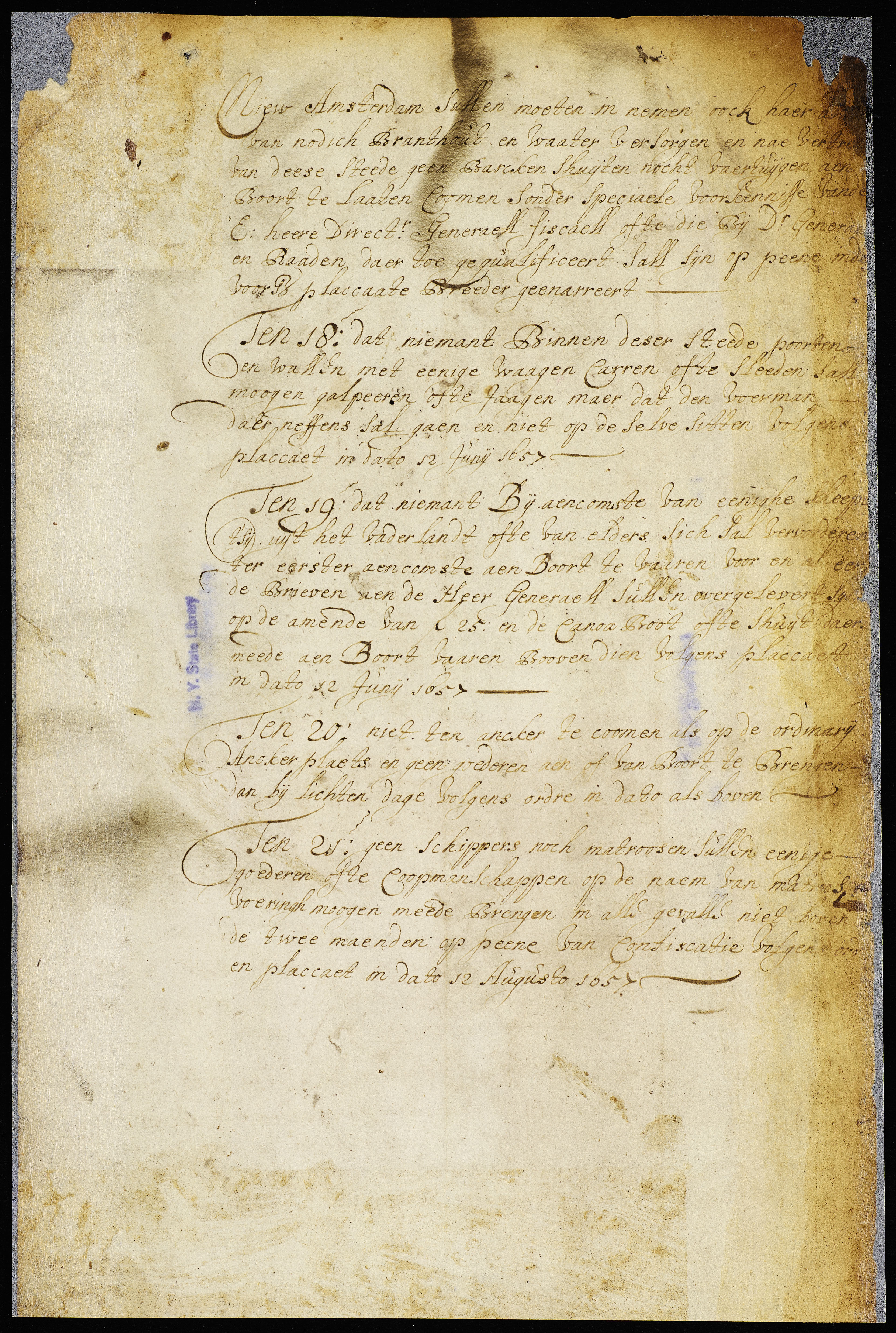The director general and council of New Netherland [ send ] greetings to all those who hear, see or read this, [ and ] make known how from time to time various ordinances and proclamations have been enacted and posted by them, aiming at the preservation of good government, order, and the prevention of smuggling. However, because the majority of these have fallen into disrepute as well as disuse by many through connivance and non-execution, therefore, the director general and council have considered it highly necessary to renew some of them, and to bring them back again into memory as a reminder to their good subjects, as they hereby do order and command[1]:
Not to tap on the Sabbath[2]
First, that no one shall, on the Sabbath of the Lord, during divine service, directly or indirectly be allowed to tap any beer, wine or spirits, or to keep a tavern, according to the proclamations of the last of May 1647, 26 September 1656, and 12 June 1657.[3]
Not to keep any taverns after 9 o’clock in the evening
Second, also, that no one shall keep any taverns after 9 o’clock in the evening when the bell ceases to ring, according to the aforesaid proclamation of the end of May 1647.
Not to sell any strong drink to the Indians
Third, that no one shall directly or indirectly sell or give out any strong drink to the Indians, according to the proclamations dated 26 September 1656 and 12 June 1657.[4]
Not to damage any fences; to keep them in repair
Fourth, that no one shall climb into any gardens, farmlands or orchards, much less damage the fruits thereof, [ or ] remove the clapboards or other fences; also, that everyone shall properly fence in his gardens, farmlands or orchards, and lots, which being done and still suffering damage by someone or by someone’s animals, [ such person ] to be brought to justice for it and punished according to the proclamation issued the first of July 1647.[5]
Not to bring any goods ashore or on board unless the duties thereof are first paid
Fifth, that no one shall be allowed to bring any goods or merchandise from ships to shore or from shore to ship, much less be allowed to export them, without first having them properly recorded, inspected, and paying the customary duties thereon; especially the goods and merchandise going to and coming from Virginia, New England, the Caribbean islands, and other places lying outside this our government; all which must pay 10 percent according to custom and order.
No one to depart without a pass
Sixth, that no persons with any ships or barks shall be allowed to depart without a proper pass; also, that no skippers or bark captains be allowed to transport any persons without a pass, under penalty of the proclamation issued the 4th of July 1647.[6]
Order concerning constmction on lots
Seventh, that everyone shall properly build on the lots granted to and obtained by them, with the prior knowledge of the appointed surveyors, according to the order of the 26th of July 1647.[7]
No tapsters allowed to brew
Eighth, that no tapsters shall be allowed to brew and no brewers be allowed to tap; or to sell any beer door to door by the pail, whether it be small or heavy beer, according to the ordinance of the 12th of January 1648, hereafter renewed several times.[8]
Orders concerning wooden chimneys
Ninth, that, in order to prevent fire and damage within the city of N. Amsterdam, no one shall be allowed to make wooden or plastered chimneys, or repair those already built; also, that all chimneys shall be properly swept and kept clear by statute of the fire wardens, according to the proclamation of the 23rd of January 1648.[9]
To use no weights or measures except those of Amsterdam
Tenth, to use within this our government no other measure, ell or weight except those of Amsterdam, according to the proclamation of the 10th of March 1648.[10]
Order against brawling
Eleventh, all brawling, maiming, knife-pulling, and wanton acts are forbidden according to the laudable statutes of the aforesaid city of Amsterdam; and all innkeepers and tapsters remain bound and obligated by oath, to report such brawling, maiming, knife-pulling, and wanton acts immediately to the fiscal, upon [ pain of ] being deprived of his trade and a fine assessed thereon. Amplified on the 15th of December 1657.[11]
To do no illicit work on the Sabbath
Twelfth, that no one shall be allowed to fish, hunt, or do any ordinary business on the Lord’s Sabbath, much less commit any unlawful acts, upon pain of bodily arrest and arbitrary punishment, according to the proclamations of the 29th of April 1648.[12]
Not to detain or incite another man’s servant or maid
Thirteenth, not to seduce or incite anyone’s servants, male or female; or to be allowed to shelter the same longer than 24 hours, as well as fugitives and foreigners, without reporting the same to the fiscal , magistrates, or schouts; and that all servants, male and female, remain bound to complete and obey their contracts, on pain of arbitrary punishment, according to the ordinance of the 6th of October 1648.[13]
No wine or beer to be laid in without notification
Fourteenth, that no brewers, factors, or merchants shall be allowed to send out any unexcised beer or wine, or be allowed to move the same beyond their houses from one cellar to another, without having first recorded the same and receiving for it an excise receipt, on [ pain ] of forfeiting such wine and beer, and fines imposed thereon by the proclamation of the 8th of November 1648.[14]
Order for the bakers
Fifteenth, that all bakers shall bake white bread and coarse bread at the [ established ] weight, and sell it at the established price, or hereafter to be established according to the paucity of grain, pursuant to the order and proclamations repeatedly renewed, the last dated the 26th of September 1656.[15]
Public highways to be properly maintained
Sixteenth, all streets, paths, and public highways to be properly maintained, put in shape, cleaned, and kept passable, according to the ordinance of the 23rd of May 1650.[16]
Order concerning smuggling
Seventeenth, in order to prevent all fraud and smuggling, the director general and council ordered under date 28 August 1651 that all ships and vessels departing from here to the fatherland, Virginia, South River or elsewhere, shall be obligated to take in their full cargo before this city of New Amsterdam; also, provide themselves here with necessary firewood and water, and after their departure from this city, allow no barks, boats, or vessels on board without special prior knowledge of the honorable lord director general, fiscal , or whomsoever shall be authorized to do so by the director general and council, on pain as is more fully stated in the aforesaid proclamation.[17]
Eighteenth,[18] that no one shall be allowed to gallop or race about with any wagons, carts, or sleighs inside the gates and walls of this city, but the driver shall walk alongside and not sit thereon, according to the proclamation dated the 12th of July 1657.[19]
Nineteenth, that no one, upon the arrival of any ships, whether from the fatherland or elsewhere, shall attempt at their first arrival to go on board before and until the letters are delivered to the lord General, under penalty of /25 and [ forfeit ] of the canoe, boat or scow used to go on board, especially pursuant to the proclamation dated the 12th of June 1657.[20]
Twentieth, not to come to anchor except at the ordinary anchorage, and not to convey any goods on board or ashore except in daylight, according to the ordinance dated as above.
Twenty-first, no skippers or sailors shall be allowed to bring with them any goods or merchandise under the guise of seaman's freight; in any case not exceeding two months wages, on pain of confiscation according to the ordinance and proclamation dated the 12th of August 1657.[21]






